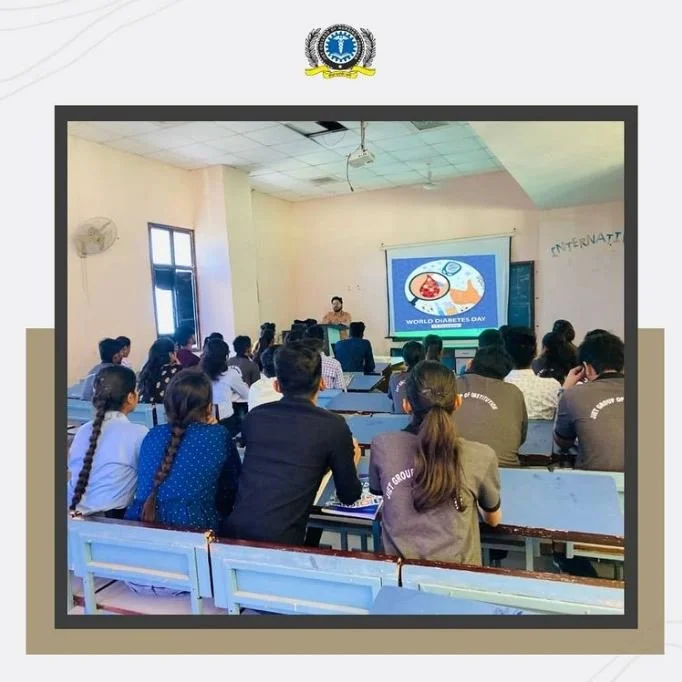
B.Sc. Nursing Course
Overview
The B.Sc. Nursing program is designed to give students a wider understanding of nursing based on scientific principles and clinical experience. The program includes a 4-year course, and one is organized into eight semesters. The program embraces a competency-based and outcome-based curriculum encompassing foundational, core, and elective courses. It is affiliated with the Rajasthan University of health sciences, Jaipur. Students must appear for University examinations at the end of each semester during the course.
Course Highlights
| Course level | Graduate |
|---|---|
| Duration | 4 Years |
| Examination Type | Semester System |
| Program Eligibility | 10+2 or equivalent with a minimum of 50% marks |
Educational Objectives
Over the first and second semesters, subjects covered include applied basic and behavioral sciences (Anatomy, Physiology, Biochemistry, Nutrition, Psychology, and Sociology), Nursing Foundations, Communicative English, and Health Informatics. The third and fourth semesters focus mainly on Adult Health Nursing and specialties in Medical-Surgical Nursing with integrated pathophysiology. Subjects like Applied Microbiology, Genetics, Professional values, and Ethics, Pharmacology, and Pathology are also covered in these semesters. The fifth to seventh semesters include Child Health Nursing, Mental Health Nursing, Community Health Nursing, Introduction to Forensic Nursing, Obstetrics and Gynaecology Nursing, Nursing Education, Nursing Management and Leadership, and Nursing Research and Statistics. The eighth semester is a rotating internship in the main clinical areas of nursing.

A career in nursing focuses on providing care to individuals, families, and communities in order for them to achieve, maintain, or regain optimal health and quality of life. The way nurses care for patients, their education, and the extent of their practise can set them apart from other healthcare professionals. The way nurses care for patients, their education, and the extent of their practise can set them apart from other healthcare professionals.
read more
In order to prepare clinically exceptional, professionally qualified nurses who will work effectively in all healthcare settings to address the requirements of society, the College is committed to offering nursing education that is grounded in scientific principles and practises. The College supports faculty development and nursing research. The parent hospital of the college is JIET Hospital. It has a hospital with 350+ beds.
About Nursing
+ PROGRAM OUTCOMES (PO)
On completion of B.Sc. Nursing Degree programme the graduates will be able to:
PO1. Apply knowledge from physical, biological, and behavioral sciences, medicine, including alternative systems and nursing in providing care to individuals, families, and communities.
PO2. Demonstrate an understanding of lifestyle and other factors, which affect the health of individuals and groups.
PO3. Provide nursing care based on steps of the nursing process in collaboration with individuals and groups through using the latest trends and technologies.
PO4. Demonstrate critical thinking skills in making decisions in all situations to provide quality care.
PO5: Utilize the latest trends and technology in providing health care.
PO6. Provide promotive, preventive and restorative health services in line with the national health policies and programs.
PO7. Practice within the framework of the code of ethics and professional conduct and acceptable standards of practice within the legal boundaries.
PO8. Communicate effectively with individuals and groups and members of the health team to promote effective interpersonal relationships and teamwork.
PO9. Demonstrate skills in teaching to individuals and groups in clinical/community health settings.
PO10. Participate effectively as members of the health team in the health care delivery system.
PO11. Demonstrate leadership and managerial skills in clinical / community health settings.
PO12. Conduct need-based research studies in various settings and utilize the research findings to improve the quality of care.
PO13. Demonstrate awareness and interest and contribute towards advancement of self and of the profession.
+ COURSE OUTCOMES (CO)
+CURRICULUM
Career Opportunities
There are various career opportunities available for candidates after completing BSc Nursing. Some of the career options are:
Registered Nurse (RN)
Nurse Practitioner (NP)
Clinical Nurse Specialist (CNS)
Nurse Educator
Nurse Researcher
Public Health Nurse
Home Health Nurse
Travel Nurse
B.Sc Nursing Labs
There are various career opportunities available for candidates after completing BSc Nursing. Some of the career options are:
Adult Nursing/Advance Clinical Lab
Pre-Clinical Lab
Child Health Nursing
Community Health Nursing
Obstetrics & Gynecological Lab
Mental Health Nursing
Computer Lab
Sports Lab
FAQs
+ What are the eligibility criteria for admission to the Nursing program at JIET?
To be eligible for admission, you must have passed 10+2 with a minimum of 45% marks in the science stream, with Physics, Chemistry, and Biology as compulsory subjects.
+ What is the duration of the Nursing program at JIET?
The duration of the Nursing program at JIET is four years.
+ Is there an entrance exam for admission to the Nursing program at JIET?
Yes, there is an entrance exam for admission to the Nursing program at JIET. The entrance exam is conducted by the Rajasthan University of Health Sciences.
+ What is the syllabus of the entrance exam for the Nursing program at JIET?
The entrance exam for the Nursing program at JIET consists of multiple-choice questions in Physics, Chemistry, Biology, and General Knowledge.
+ What are the job opportunities for Nursing graduates from JIET?
Nursing graduates from JIET can find employment in hospitals, nursing homes, clinics, and other healthcare facilities. They can work as staff nurses, nurse practitioners, nursing supervisors, and healthcare administrators.
















































